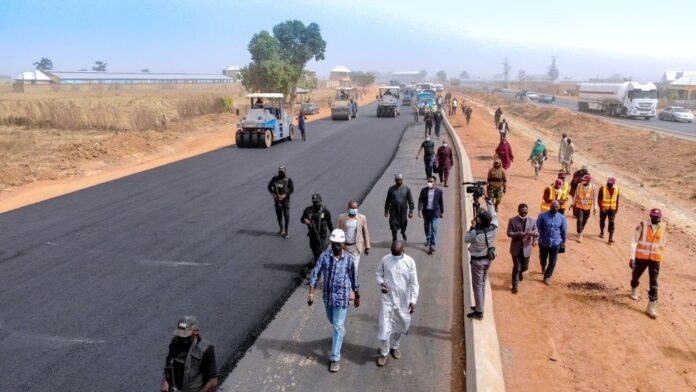The Federal Government has set an ambitious 14-month deadline for the completion of the Abuja-Kaduna-Kano dual carriageway, a critical infrastructure project aimed at improving connectivity and reducing travel time across Northern Nigeria.
Minister of Information and National Orientation, Mohammed Idris, announced the timeline on Thursday during the inauguration of rehabilitation work on Section 1 of the road, which spans from Abuja to Kaduna. The project, split into three segments for efficient delivery, covers Abuja-Kaduna (Section 1), Kaduna-Zaria (Section 2), and Zaria-Kano (Section 3).
Scope of Rehabilitation
The rehabilitation includes scarification and pulverization of the existing road surface, which will be repurposed as sub-base material. Additional work involves filling embankments, installing reinforced concrete drains, and constructing 200mm thick continuously reinforced concrete pavement (CRCP) for durability. Median barriers, solar-powered streetlights, and other hydraulic structures will also enhance safety and usability.
The Minister of Works, David Umahi, elaborated on the project’s technical aspects, emphasizing the importance of quality and longevity. “This road is being built to last between 50 and 100 years. Solar lights will be installed along the stretch to improve visibility and safety for road users,” Umahi said.
Tinubu’s Directive Spurs Urgency
President Bola Tinubu has prioritized the Abuja-Kano road, recognizing its strategic importance to Nigeria’s economy and transportation network. Idris underscored the President’s determination to deliver the project within the stipulated timeframe.
“President Tinubu is committed to ensuring this road is completed in record time. The initial contractor proposed three years for completion, but the government insisted on 14 months. This road is vital to Nigerians, and delays will not be tolerated,” Idris stated.
To expedite progress, the Federal Government terminated the previous contract with Julius Berger Plc, citing delays and an exorbitant cost revision. Umahi revealed that the contractor had requested an increase in project costs from ₦797 billion to ₦1.5 trillion—an 88.21% hike.
Contract Drama and Competitive Tendering
Following the contract revocation, the Ministry of Works initiated a selective tendering process, inviting six contractors to bid for the project. These included Julius Berger Plc, Hitech Construction, Infouest Nigeria, CBC Nigeria, CCECC Nigeria, and CGC Nigeria.
Umahi expressed confidence in the new arrangement, assuring Nigerians that the selected contractors are equipped to meet the tight deadline. He added, “We have resolved all political and contractual bottlenecks, and with the cooperation of the National Assembly, this project will be completed as planned.”
Addressing Road Deterioration
Umahi highlighted the dire condition of the Abuja-Kaduna stretch, which had deteriorated over the years due to poor drainage, potholes, and structural failures. Emergency repairs are currently underway on four stretches to alleviate road users’ suffering while the main rehabilitation progresses.
“The existing pavement has suffered significant damage, including alligator cracks, rutting, and corrugation. These issues are being addressed to ensure the new road meets international standards,” Umahi said.
Extensions and Strategic Additions
In addition to the main carriageway, the project includes a five-kilometer extension toward the Abuja-Lokoja road and a link to the Aminu Kano International Airport. These extensions aim to improve access and support economic activities in the region.
Road Users Welcome the Development
The announcement has sparked optimism among Nigerians, especially regular commuters on the heavily trafficked route. For years, the Abuja-Kaduna-Kano road has been plagued by congestion, accidents, and delays.
“I’ve been traveling this road for business for over a decade, and the delays have been frustrating. I’m glad the government is finally taking decisive action,” said Musa Ibrahim, a trader from Kano.
However, skepticism remains among some citizens, who question whether the government can meet the ambitious timeline. Others expressed concerns about corruption and project abandonment, common challenges in Nigeria’s construction sector.
FG Assures Accountability
Addressing these concerns, Idris reaffirmed the government’s commitment to transparency and efficiency. “The President has given a marching order, and there will be no issues. This road will be completed in 14 months, as promised,” he said.
The successful completion of the Abuja-Kano road will mark a significant milestone in Nigeria’s infrastructure development, providing a vital link for trade, tourism, and national unity. As construction advances, all eyes remain on the government to deliver on its promise and meet the high expectations of Nigerians.

